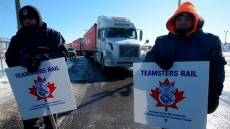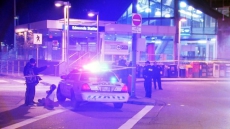OTTAWA — The Supreme Court of Canada will hear arguments starting today in a series of cases that question the depth and breadth of Canada's human smuggling laws.
Four of the five cases the court will consider involve people connected to the arrival of ships filled with Sri Lankan migrants off the coast of B.C.
One of the cases involves four defendants who were charged with human smuggling on board the MV Ocean Lady, which was carrying 76 Sri Lankan Tamils when it was intercepted in 2009.
The B.C. Civil Liberties Association is an intervener in one of the cases that considers the constitutionality of section 117 of the Immigration and Refugee Protection Act.
The provision criminalizes any person who knowingly helps an undocumented individual enter Canada.
At trial, the accused argued section was overly broad, as it could criminalize humanitarian workers or family members of refugees.
The B.C. Supreme Court agreed and found the provision to be unconstitutional, but that was overturned by the B.C. appeal court.
"Parliament intended to create a broad offence with no exceptions, directed to concerns of border control and the particular issue of deterring and penalizing those who assist others in entering Canada illegally,'' wrote B.C. Court of Appeal Justice Kathryn Neilson in her ruling.
The BCCLA says it will argue at the Supreme Court that the Crown's broad characterization of the law's objectives is unsupported by its legislative history.
Further, the association will argue that vague definitions of legal objectives are inappropriate because they undermine the court's ability to determine whether legislation complies with the Charter.
The arrivals on the Ocean Lady and the MV Sun Sea — which was intercepted off B.C.'s coast in 2010 with 492 migrants aboard — prompted a national debate about Canada's existing refugee and human smuggling legislation and spurred the government to promise a crackdown.
Passengers on the ships paid between $30,000 and $40,000 for a berth on the voyage and made refugee claims upon their arrival. But those who worked on the ships were arrested and charged as human smugglers.
The fifth case on human smuggling to be considered by the Supreme Court involves a Cuban man arrested for running a smuggling boat to the U.S.
When he was deported, he made a refugee claim in Canada but was turned away because of his conviction.





